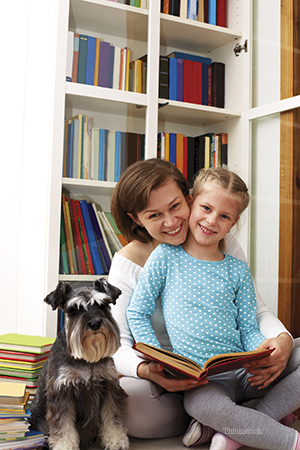
It’s often believed that dogs don’t get jealous, but rather that we’re anthropomorphizing feelings of jealousy onto our dog. However, if you’ve ever had a dog, you likely know they do indeed seem to get jealous. Well, a new study performed at the University of California, San Diego finally gives us some proof.
This study looked at 36 dogs and their owners. The researchers had the dog guardians do three things:
- Demonstrate acts of affection to a fake, animatronic dog
- Demonstrate acts of affection to a plastic, jack-o-lantern, Halloween pail
- Read a children’s book aloud, ignoring their dog
What did the researchers find?
Researchers found that approximately 80% of the dogs physically pushed their guardians when they were demonstrating affection to the animatronic dog. Only 40% of the dogs did this when the owners faked affection to the Halloween pail, and only 20% of dogs wanted attention when their owners read out loud while ignoring their dog. In addition, approximately 25% of the dogs acted aggressively towards the fake, competing pup--barking at it and even trying to bite it. Only one, assumedly needy dog, acted aggressively towards the plastic Halloween pail or book1.
What did the researchers conclude?
“Dogs do engage in what appear to be jealous behaviors,” while also being smart enough to try to, “break up the connection between the owner and a seeming rival,” said UCSD psychology professor Christine Harris. Researchers thought that dogs may be motivated to, “protect an important social relationship” with their owner1.
The findings suggested that these behaviors likely evolved from dogs having to compete with their siblings for paternal resources (e.g., a mammary gland, food, etc.). As we domesticated dogs over time, we two-legged humans likely began to fill this “paternal role” for animals1.
What does the research mean to you and your dog? It’s important that you not tolerate or positively reward inappropriate behavior–whether it’s jealousy, dominance, aggression, or anything else detrimental! That’s because attention-seeking behavior can lead to, “jealousy-like behavior… that includes aggression in some cases,” said Brian Hare, a director of the Duke Canine Cognition Center at Duke University1.
A few hints to prevent your dog from getting jealous:
- When you see inappropriate, jealous behavior, give a simple, “No!” command.
- Make sure that you don’t give inappropriate rewards. For example, if your dog is acting inappropriately, don’t reach over to cuddle, “baby talk,” or reward your dog with a treat. This is inappropriately rewarding your dog for that bad behavior.
- When in doubt, consult with a veterinary behaviorist if you’re noticing that this behavior is developing in your dog.
Now that this study has shown us that dogs do indeed show jealous-like behavior, try and show equal attention to both two-legged and four-legged family members. This is especially important when introducing newborn babies to family pets. Keep in mind that the sooner you identify a problem, the easier it will be to treat!
If you have any questions or concerns, you should always visit or call your veterinarian -- they are your best resource to ensure the health and well-being of your pets.
Resources:
1. Labbe, Mark. "Study Confirms Dogs Can Feel Jealous." The Westside Story. N.p., July-Aug. 23. Web. 21 Aug. 2014.
